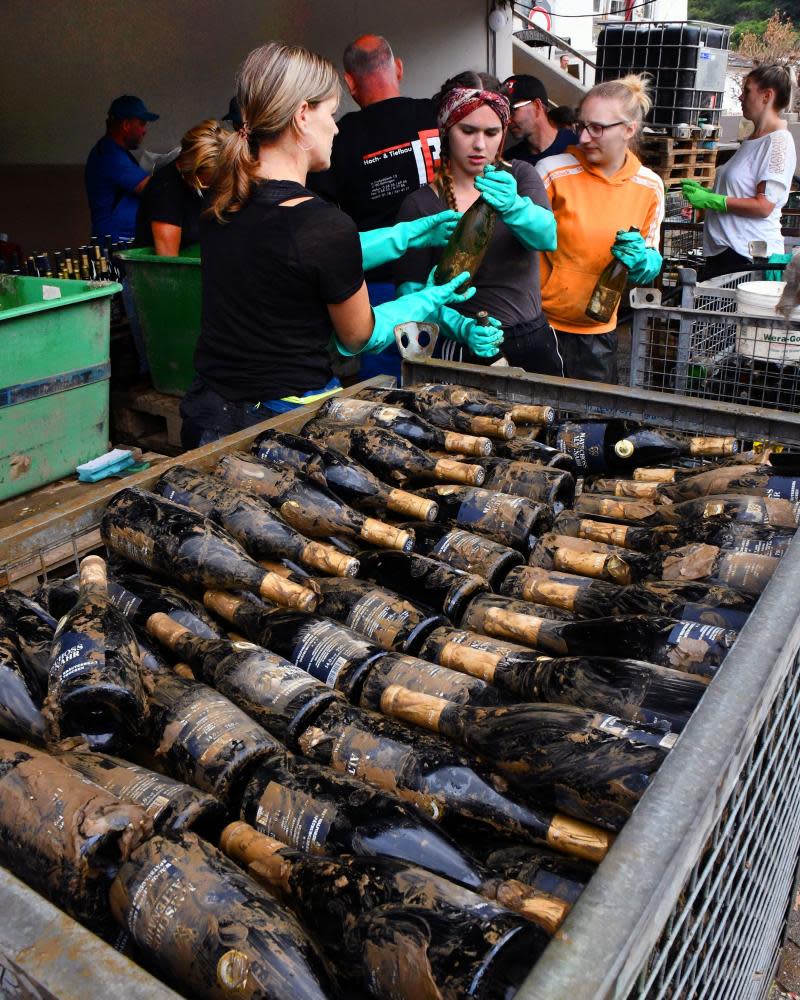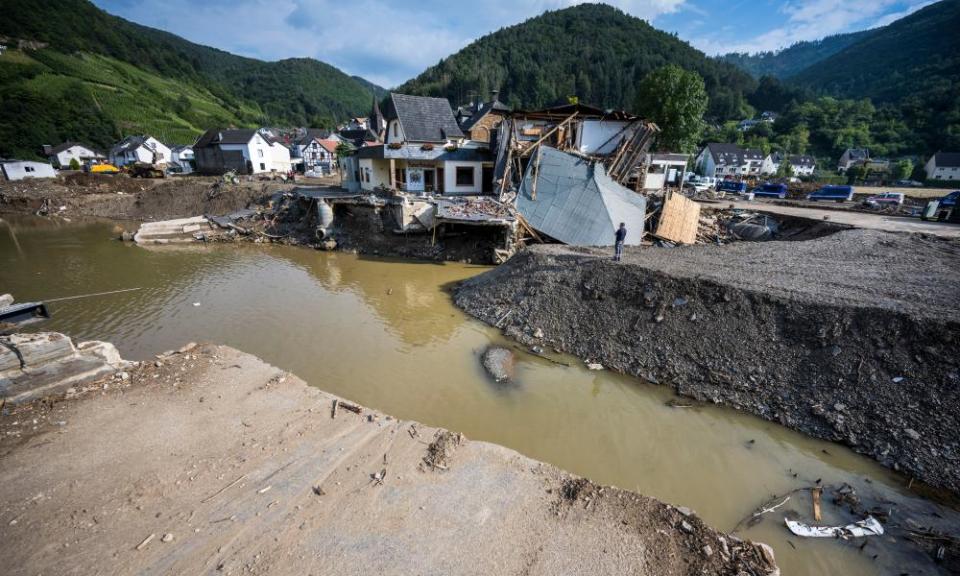German government urged to do more to help rebuild flood-hit communities

Three weeks after catastrophic floods in western Germany devastated communities and claimed at least 187 lives, those affected are calling on the government to increase its effort to salvage homes and businesses.
More than 20 people are still missing after the disaster, which came after heavy rainfall caused scores of rivers to burst their banks, and led to the loss of large numbers of houses, roads and bridges.
In an appeal to the central government in Berlin, mayors from across the region called for the appointment of a reconstruction ombudsman to oversee the effort to get communities back on their feet.
“We are hugely thankful for the help we have received so far from everywhere, but that is only the beginning of this effort,” Cornelia Weigand, mayor of an association of municipalities in Altenahr said. Weigand said the affected communities were anxious to know that the reconstruction effort would not ebb after a few weeks, or be exploited politically prior to the general election next month. Any transition at central government level should also not stand in the way of the rebuilding, she said. “We need perspective, otherwise people are in danger of losing their faith.”

Thousands of homes are still without running water or electricity. An atypically cool August and the prospect of temperatures dropping further as autumn nears, has increased the sense of urgency. Teams of soldiers and a national rescue brigade, the THW, drafted in to help, are continuing to tear down destroyed buildings and prop up others close to collapse, as well as attempting to keep rats and other pests at bay and ensure contaminated water does not lead to a public health crisis.
The German Red Cross is active across the region, serving more than 10,000 warm meals every day.
A debate continues to rage about whether the warnings issued on the night of the deluge, 14 July, were sufficient. Federal, state and local officials are facing legal action by some campaigners who say warnings were not passed on with sufficient urgency to residents. Germany’s Meteorological Service (DWD) has also been criticised for appearing not to recognise the potential consequences of heavy rainfall over days.
Meanwhile the state prosecutor in Koblenz has begun amanslaughter investigation, gathering police reports and media coverage to assess whether people may have died unnecessarily, in particular 12 residents of a care facility in Sinzig.
Homemade thank you banners hanging from buildings in affected areas express the gratitude of people trying to clear up their homes to volunteers, who have come in their thousands from across Germany and neighbouring Holland. The are helping with everything from emptying cellars of sludge, to collecting destroyed household possessions and disposing of them at designated rubbish sites, as well as in distributing food, drink and clothing.
Volunteer fire brigades from all over Germany have joined the effort and continue to send members to help the salvage operation, as do builders, skilled craft workers and restorors.
A roofer from Lahnstein, in the state of Rhineland Palatinate, where many communities have been affected, issued a nationwide appeal to his colleagues and on Wednesday, workers from more than 100 companies turned up at a designated meeting point. They drove in a convoy into the affected Ahr valley, their vans and lorries loaded with gutter pipes, down spouts, tarpaulin and other construction materials.
“We wanted to send a signal to people in the region that it’s not just filth being dragged out of the valley, but that things are being rebuilt again too,” Bernd Krinninger, who initiated the voluntary effort, told the broadcaster Südwestrundfunk. The roofers are now patching up roofs, reinforcing beams and rafters and fixing drainage systems.

“We would not manage without the help of these volunteers,” said Waltraut Schütz, from Mayschoß. Her home had stood in water up to the ceiling of the second floor on the night of the flooding, with the family forced to take refuge under their roof for several days before they were evacuated. The cost to repair the gaping hole in her roof has been estimated at €25,000, she said.
Insurance companies have had to send hundreds of agents to assess the damage, as most people have no electricity and therefore no internet connection to allow them to send documentation digitally.
This week the government gave assurances that should prevent tens of thousands of businesses affected by the flooding from having to declare bankruptcy. In the coming days MPs are expected to return to parliament, despite the summer recess, to vote on the emergency suspension of the insolvency law. The justice minister, Christine Lambrecht, said the decision was based on experience gained in the pandemic, when similar rules were applied to businesses that had been financially sound until lockdown, helping prevent a wave of bankruptcies.
Meanwhile, as millions of euros of donations continue to reach the affected areas, vintners in the region, which is famous for its pinot noir – or Spätburgunder – wines, in particular, have launched their own campaign. They are auctioning off Flutwein (flood wine) – mud-caked bottles pulled out of their cellars in their tens of thousands – to raise money for the scores of vineyard owners whose livelihoods have been destroyed.

 Yahoo Finance
Yahoo Finance 